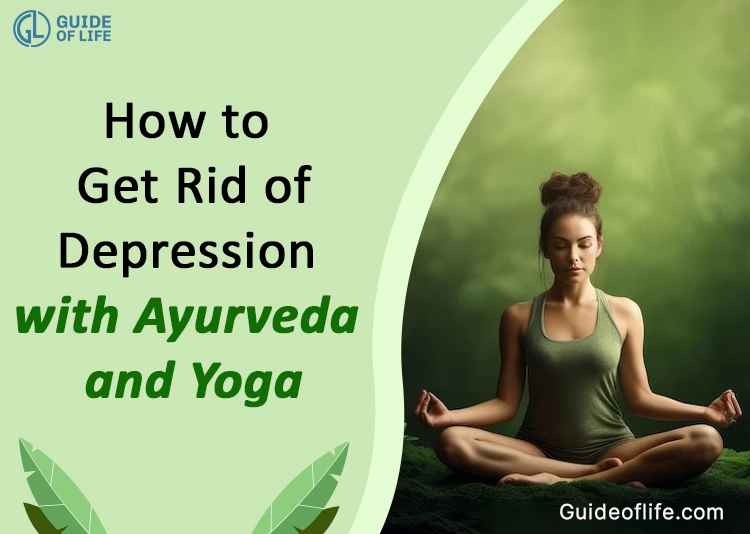How to get rid of depression with Ayurveda and Yoga

Depression is a common and serious medical illness that negatively affects how you feel, the way you think and how you act. It can lead to a variety of emotional and physical problems and can decrease your ability to function at work and at home.
Depression can cause persistent sadness, loss of interest, feeling worthless, difficulty concentrating, trouble sleeping, changes in appetite, and thoughts of death or suicide.
Ayurveda, a holistic system of medicine practiced in India for thousands of years, focuses on restoring balance to the mind, body, and spirit. Discover how Ayurveda can help with depression and promote overall well-being.
Yoga is a mind-body practice that combines physical postures, breathing exercises, and meditation. It has been shown to be effective in reducing stress, anxiety, and depression.
Both Ayurveda and yoga can be used to treat depression. Ayurveda focuses on identifying the root cause of the depression and correcting it. Yoga helps to reduce stress and anxiety, improve mood, and promote overall well-being.
Here are some specific ayurvedic and yoga practices that can help to get rid of depression:
Read More: How Ayurveda will Change the Daily Skincare in 2024
Ayurvedic Practices
1. Dinacharya:
Dinacharya is a Sanskrit word that means "daily routine." It is a set of Ayurvedic practices that are followed throughout the day. Dinacharya includes practices such as waking up early, eating regular meals, and getting regular exercise.
2. Herbal Remedies:
There are a number of Ayurvedic herbs that can be used to treat depression. Some of the most common herbs used for depression include ashwagandha, brahmi, and shankhapushpi.
Read More: How Ayurvedic Treatments for Fatty Liver & Tips Promote Wellness
3. Panchakarma:
Panchakarma is a five-day detoxification process that is used to cleanse the body and mind. Panchakarma can be very effective in treating depression, but it is important to consult with a qualified Ayurvedic practitioner before undergoing this treatment.
Yoga Practices
1. Pranayama:
Pranayama is a Sanskrit word that means "breath control." There are a number of different pranayama practices that can be used to reduce stress and anxiety. Some of the most common pranayama practices for depression include nadi shodhana (alternate nostril breathing) and kapalabhati (breath of fire).
Read More: What Ayurvedic Remedies and Medicines Promote Restful Sleep?
2. Meditation:
Meditation is a mind-body practice that involves focusing your attention on the present moment. Meditation has been shown to be very effective in reducing stress and anxiety, improving mood, and promoting overall well-being.
3. Asanas:
Asanas are the physical postures of yoga. There are a number of different asanas that can be used to treat depression. Some of the most common asanas for depression include trikonasana (triangle pose), setu bandha sarvangasana (bridge pose), and balasana (child's pose).
If you are suffering from depression, it is important to seek professional help. Ayurveda and yoga can be used to complement conventional treatment, but they should not be used as a substitute for professional care.
Read More: How Panchakarma Helps Your Body Feel Better
Here are some additional tips for getting rid of depression
1. Get regular exercise -
Exercise is one of the best things you can do for your mental and physical health. Aim for at least 30 minutes of moderate-intensity exercise most days of the week.
Read More: How to Identify 11+ Symptoms and Signs of Iron Deficiency
2. Eat a healthy diet -
Eating a healthy diet can help to improve your mood and energy levels. Avoid processed foods, sugary drinks, and excessive caffeine and alcohol.
3. Get enough sleep -
Most adults need 7-8 hours of sleep per night. When you're well-rested, you're better able to cope with stress and manage your emotions.
Read More: 11+ Dincharya Ayurvedic Habits for a Healthier Daily Life
4. Connect with others -
Social support is important for everyone, but it's especially important for people with depression. Spend time with loved ones, join a support group, or volunteer in your community.
5. Learn to relax -
There are a number of different relaxation techniques that can help to reduce stress and anxiety. Some examples include meditation, deep breathing, and yoga.
Read More: 22 Ayurvedic Beauty Tips for Daily Skin Care Routine
If you are struggling to get rid of depression on your own, please reach out for help. There are many resources available, including therapists, counselors, and support groups. Additionally, consider exploring valuable insights and guidance on managing mental health through resources like the Guide of Life blogs.

